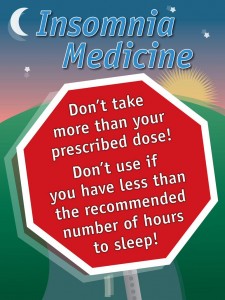Some Sleep Drugs Can Impair Driving
 Many people take sedatives to help them sleep. The Food and Drug Administration (FDA) is reminding consumers that some drugs to treat insomnia could make them less able the next morning to perform activities for which they must be fully alert, including driving a car.
Many people take sedatives to help them sleep. The Food and Drug Administration (FDA) is reminding consumers that some drugs to treat insomnia could make them less able the next morning to perform activities for which they must be fully alert, including driving a car.
FDA has informed manufacturers that the recommended dose should be lowered for sleep drugs approved for bedtime use that contain a medicine called zolpidem. FDA is also evaluating the risk of next-morning impairment in other insomnia medications.
People with insomnia have trouble falling or staying asleep. Zolpidem, which belongs to a class of medications called sedative-hypnotics, is a common ingredient in widely prescribed sleep medications. Some sleep drugs contain an extended-release form of zolpidem that stays in the body longer than the regular form.
FDA is particularly concerned about extended-release forms of zolpidem. They are sold as generic drugs and under the brand name Ambien CR. New data show that the morning after use, many people who take products containing extended-release zolpidem have drug levels that are high enough to impair driving and other activities. FDA says that women are especially vulnerable because zolpidem is cleared from the body more slowly in women than in men.
FDA also found that some medicines containing the immediate-release form of zolpidem can impair driving and other activities the next morning. They are marketed as generic drugs and under the following brand names:
- Ambien (oral tablet)
- Edluar (tablet placed under the tongue)
- Zolpimist (oral spray)
FDA has informed the manufacturers of products containing zolpidem that the recommended dose for women for both immediate- and extended-release products should be lowered. FDA is also suggesting a lower dose range for men.
Drowsiness is already listed as a side effect in the drug labels of insomnia drugs, along with warnings that patients may still feel drowsy the day after taking these products. However, people with high levels of zolpidem in their blood can be impaired even if they feel wide awake. “All insomnia drugs are potent medications, and they must be used carefully,” says Russell Katz, M.D., director of FDA’s Division of Neurology Products.
Recommended Doses
FDA has informed manufacturers that changes to the dosage recommendations for the use of zolpidem products should be made:
- For women, dosing should be cut in half, from 10 mg to 5 mg for products containing the regular form of zolpidem (Ambien, Edluar, Zolpimist) and from 12.5 mg to 6.25 mg for zolpidem extended-release products (Ambien CR).
- For men, the lower dose of 5 mg for immediate-release zolpidem and 6.25 mg for extended-release should be considered.
Intermezzo, a more recently approved drug containing zolpidem, is used when middle-of-the-night wakening is followed by difficulty returning to sleep and at least 4 hours remain available for sleep. The recommended dose for Intermezzo remains at 1.75 mg for women and 3.5 mg for men.
FDA is evaluating the risk of next-day impairment with other insomnia drugs, both prescription and over-the-counter (OTC) drugs.
Most Widely Used Sleep Drug
Zolpidem—which has been on the market for nearly 20 years—is by far the most widely used active ingredient in prescription sleep medications, says Ronald Farkas, M.D., Ph.D., a medical team leader in FDA’s neurology products division. About 9 million patients received products containing zolpidem from retail pharmacies in 2011.
FDA’s Adverse Event Reporting System has logged approximately 700 reports of zolpidem use and impaired driving ability and/or traffic accidents. However, FDA cannot be certain that those incidents are conclusively linked to zolpidem. Many of those reports lacked important information, such as the dose of zolpidem and the time at which it was taken, the time of the accident, and whether alcohol or other drugs had also been used.
“We have had longstanding concern about sleep medications and driving. However, only recently have data from clinical trials and specialized driving simulation studies become available that enabled FDA to better establish the risk of driving impairment and to make new recommendations about dosing,” Farkas says.
An Individual Decision
FDA is urging health care professionals to caution patients who use these products about the risks of next-morning impairment and its effect on activities, such as driving, that require alertness.
The agency recommends that people who take sleep medications talk to their health care professional about ways to take the lowest effective dose. It should not be assumed that OTC sleep medicines are necessarily safer alternatives.
With zolpidem, Farkas notes that people must be aware of how this drug affects them personally. “Even with the new dosing recommendations, it’s important to work with your health care professional to find the sleep medicine and dose that work best for you,” he says.
Patients are asked to contact FDA’s MedWatch program if they suffer side effects from the use of zolpidem or another insomnia medication.











